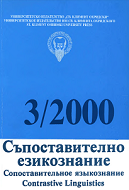Дали граматическите балканизми са всъщност балканизми - характеристика на фона на други индоевропейски езици (славянски, германски, романски)
Are grammatical balkanisms really balkanisms - characteristics on the background of other Indo-European languages (Slavic, Germanic, Romance)
Author(s): Zbigniew RusekSubject(s): Language studies, Theoretical Linguistics, Lexis, Sociolinguistics
Published by: Софийски университет »Св. Климент Охридски«
Summary/Abstract: The aim of this paper is to decide, whether the so-called grammatical balkanisms can be acknowledged as balkanisms. Traditionally, the features like: loss of the declension, a veiy rich temporal system, loss of the infinitive, the post-positive determiner, the so-called uyer” vowel, the future tense created by the auxiliary with the meaning ‘velle’ are regarded as balkanisms. Sometimes other features, like the conditional mood of the “Balkan” type are regarded as balkanisms. The following languages were acknowledged as “Balkan”: Bulgarian, Macedonian, Romanian, Modern Greek, Albanian and sometimes Serbo-Croatian. Nevertheless, having studied these problems on the Indo-European background it is possible to assert that the so-called grammatical balkanisms are not really balkanisms, because the majority of these features are known in other Indo-European languages, especially the loss of the declension and the veiy rich temporal system. Other “Balkan” features, like loss of the infinitive, the future tense created by the auxiliary with the meaning 'velle ’ and the conditional mood of the “Balkan ” type are known in English. Even the post positive determiner is known beyond the Balkan Peninsula, namely in the Northern Germanic (Scandinavian) languages: Norwegian and Swedish. The second problem is that the so-called “Balkan” features are met in Balkan languages with no equal intensitivity, for instance: total loss of the declension in Bulgarian and Macedonian, partial loss of the declension in Romanian and a reduction by one case in Modern Greek (from 4 cases to 3) and Albanian (to 5 cases). Summing up, I can assert that the grammatical criteria for determination of the Balkan league are not appropriate and the lexical criteria are better, because there are a lot of lexical items, which are known only in Balkan languages. Moreover, these lexical items are usually known in all Balkan languages. Using the lexical criteria we can regard Serbo/Croatian as a Balkan language.
Journal: Съпоставително езикознание / Сопоставительное языкознание
- Issue Year: 2000
- Issue No: 3
- Page Range: 93-104
- Page Count: 12
- Language: Bulgarian
- Content File-PDF

